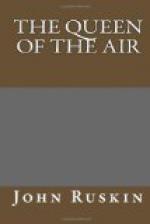73. But with the early serpent-worship there was associated another, that of the groves, of which you will also find the evidence exhaustively collected in Mr. Fergussen’s work. This tree-worship may have taken a dark form when associated with the Draconian one; or opposed, as in Judea, to a purer faith; but in itself, I believe, it was always healthy, and though it retains little definite hieroglyphic power in subsequent religion, it becomes, instead of symbolic, real; the flowers and trees are themselves beheld and beloved with a half-worshipping delight, which is always noble and healthful.
And it is among the most notable indications of the volition of the animating power that we find the ethical signs of good and evil set on these also, as well as upon animals; the venom of the serpent, and in some respects its image also, being associated even with the passionless growth of the leaf out of the ground; while the distinctions of species seem appointed with more definite ethical address to the intelligence of man as their material products become more useful to him.
74. I can easily show this, and, at the same time, make clear the relation to other plants of the flowers which especially belong to Athena, by examining the natural myths in the groups of the plants which would be used at any country dinner, over which Athena would, in her simplest household authority, cheerfully rule here in England. Suppose Horace’s favorite dish of beans, with the bacon; potatoes; some savory stuffing of onions and herbs, with the meat; celery, and a radish or two, with the cheese; nuts and apples for desert, and brown bread.




